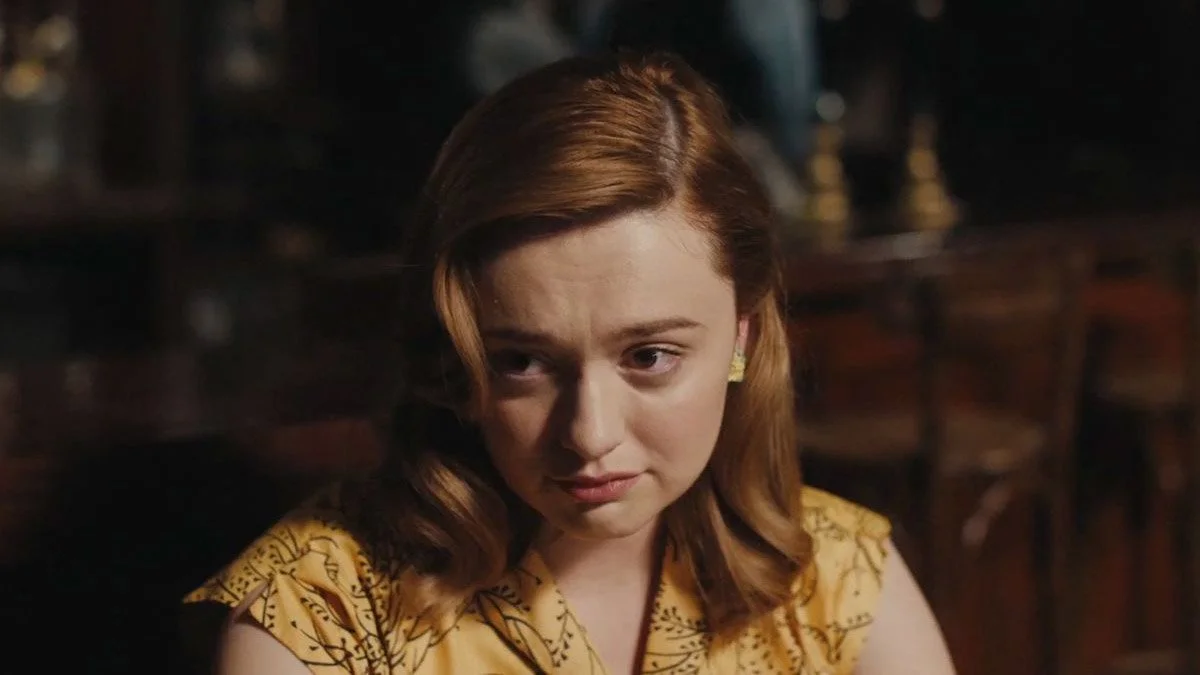Pure Heroine
In many circles today, there is a growing lack of faith in British actors. Specifically young British actors, actors capable of standing their ground opposite legends in the game and, crucially, actors capable of injecting any kind of wholly new energy into the story they’re telling. Not just replacing one another and reading lines politely, but really living.
It’s both fitting and a little bit miraculous, then, that Aimee Lou Wood does exactly that and then some opposite Bill Nighy in Oliver Hermanus’ Living, itself adapting Akira Kurosawa’s Ikiru. The film ostensibly belongs to Nighy, who plays a world-weary pencil pusher who’s told he doesn’t have much longer to live, but Wood lifts the film up entirely, and makes it shimmer.
The Stockport-born actor only has three feature film credits to her name, including this one, and might look familiar to many from her main role in Netflix comedy series Sex Education. That project is warm and thoughtful and incredibly funny, but you could argue that its target audience is a little smaller, and a little younger, than Living. But there’s clearly something in the water there – Wood joins co-stars Asa Butterfield, Emma Mackey, Ncuti Gatwa and Connor Swindells in moving on to bigger things beyond the series, somehow instantly showing versatility and grace many franchise actors struggle to do for years.
In Sex Education, Wood’s character Aimee is sweet and strong (and has one particularly powerful storyline dealing with sexual harassment and trauma) but does often feel like something of a comic foil to Mackey’s character Maeve. It’s more a result of the writing of onscreen Aimee, but also the shackles of any kind of best friend trope that few manage to loosen.
What Wood does in Living is quietly spectacular. While Nighy delivers one of the most delicate, vulnerable performances of his career – all melancholy and regret without a hint of humour in sight, Wood, as his character Mr Williams’ young employee Margaret, has the same wide-eyed innocence she does in Sex Education without playing the tone for laughs in the slightest.
Margaret is simple in the purest sense of the word, a kind-hearted young woman who does things just because she thinks they are right and good. There’s no scheming or manipulation or cynicism – it’s a rare kind of candour that so many millennials and Gen Z people might have lost in the last few years of, well, being very tired and being very online.
There is hope in what Wood does. You could say it’s a childlike faith in the things worth living for, but that risks diminishing the control and emotional maturity required from Wood to deliver such a performance, to hold her own opposite Nighy and to teach him about what she knows. Experience, Wood tells us, is good. But trusting yourself and the path you want to follow is even better.
Wood has said recently that film is always where she wanted to end up – not television or theatre, which many young actors fresh out of drama school are drawn to first. Acting for the stage is an immense skill, demanding focus and projection and energy and power you can’t edit, or fix in post. But film acting is more restrained, where the most microscopic display of emotion risks being overplayed or misunderstood in the wrong hands. It’s easier to fail in film, from the second that you feel anything.
It’s why performers like Wood, who have this kind of incandescent energy on screen without ever blinding the story or other actors, are so rare. Her success is growing similarly to her Sex Education co-stars, but it does feel unfair to put her in any kind of comparable category. Off-screen she has spoken about her issues with body dysmorphia and eating disorders, yet on screen watching Wood just feels like a safe, warm, hopeful conversation with a friend. Aimee Lou Wood doesn’t look, sound or act like other girls, and nor should she. Long may she live among the greats.
Living is out in UK cinemas on November 4.
Sign up to our mailing list and you’ll be sent our latest Storyboard post every week with The Friday Read.

